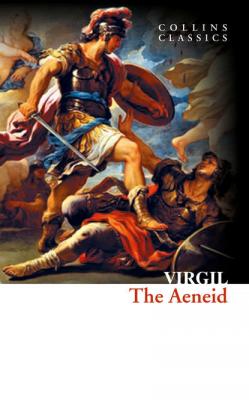The Aeneid. Публий Марон Вергилий
Читать онлайн.| Название | The Aeneid |
|---|---|
| Автор произведения | Публий Марон Вергилий |
| Жанр | Классическая проза |
| Серия | |
| Издательство | Классическая проза |
| Год выпуска | 0 |
| isbn | 9780007535293 |
When winter past, and summer scarce begun,
Invites them forth to labor in the sun;
Some lead their youth abroad, while some condense
Their liquid store, and some in cells dispense;
Some at the gate stand ready to receive
The golden burthen, and their friends relieve;
All with united force, combine to drive
The lazy drones from the laborious hive:
With envy stung, they view each other’s deeds;
The fragrant work with diligence proceeds.
“Thrice happy you, whose walls already rise!”
Aeneas said, and view’d, with lifted eyes,
Their lofty tow’rs; then, entering at the gate,
Conceal’d in clouds (prodigious to relate)
He mix’d, unmark’d, among the busy throng,
Borne by the tide, and pass’d unseen along.
Full in the center of the town there stood,
Thick set with trees, a venerable wood.
The Tyrians, landing near this holy ground,
And digging here, a prosp’rous omen found:
From under earth a courser’s head they drew,
Their growth and future fortune to foreshew.
This fated sign their foundress Juno gave,
Of a soil fruitful, and a people brave.
Sidonian Dido here with solemn state
Did Juno’s temple build, and consecrate,
Enrich’d with gifts, and with a golden shrine;
But more the goddess made the place divine.
On brazen steps the marble threshold rose,
And brazen plates the cedar beams inclose:
The rafters are with brazen cov’rings crown’d;
The lofty doors on brazen hinges sound.
What first Aeneas this place beheld,
Reviv’d his courage, and his fear expell’d.
For while, expecting there the queen, he rais’d
His wond’ring eyes, and round the temple gaz’d,
Admir’d the fortune of the rising town,
The striving artists, and their arts’ renown;
He saw, in order painted on the wall,
Whatever did unhappy Troy befall:
The wars that fame around the world had blown,
All to the life, and ev’ry leader known.
There Agamemnon, Priam here, he spies,
And fierce Achilles, who both kings defies.
He stopp’d, and weeping said: “O friend! ev’n here
The monuments of Trojan woes appear!
Our known disasters fill ev’n foreign lands:
See there, where old unhappy Priam stands!
Ev’n the mute walls relate the warrior’s fame,
And Trojan griefs the Tyrians’ pity claim.”
He said (his tears a ready passage find),
Devouring what he saw so well design’d,
And with an empty picture fed his mind:
For there he saw the fainting Grecians yield,
And here the trembling Trojans quit the field,
Pursued by fierce Achilles thro’ the plain,
On his high chariot driving o’er the slain.
The tents of Rhesus next his grief renew,
By their white sails betray’d to nightly view;
And wakeful Diomede, whose cruel sword
The sentries slew, nor spar’d their slumb’ring lord,
Then took the fiery steeds, ere yet the food
Of Troy they taste, or drink the Xanthian flood.
Elsewhere he saw where Troilus defied
Achilles, and unequal combat tried;
Then, where the boy disarm’d, with loosen’d reins,
Was by his horses hurried o’er the plains,
Hung by the neck and hair, and dragg’d around:
The hostile spear, yet sticking in his wound,
With tracks of blood inscrib’d the dusty ground.
Meantime the Trojan dames, oppress’d with woe,
To Pallas’ fane in long procession go,
In hopes to reconcile their heav’nly foe.
They weep, they beat their breasts, they rend their hair,
And rich embroider’d vests for presents bear;
But the stern goddess stands unmov’d with pray’r.
Thrice round the Trojan walls Achilles drew
The corpse of Hector, whom in fight he slew.
Here Priam sues; and there, for sums of gold,
The lifeless body of his son is sold.
So sad an object, and so well express’d,
Drew sighs and groans from the griev’d hero’s breast,
To see the figure of his lifeless friend,
And his old sire his helpless hand extend.
Himself he saw amidst the Grecian train,
Mix’d in the bloody battle on the plain;
And swarthy Memnon in his arms he knew,
His pompous ensigns, and his Indian crew.
Penthisilea there, with haughty grace,
Leads to the wars an Amazonian race:
In their right hands a pointed dart they wield;
The left, for ward, sustains the lunar shield.
Athwart her breast a golden belt she throws,
Amidst the press alone provokes a thousand foes,
And dares her maiden arms to manly force oppose.
Thus while the Trojan prince employs his eyes,
Fix’d on the walls with wonder and surprise,
The beauteous Dido, with a num’rous train
And pomp of guards, ascends the sacred fane.
Such on Eurotas’ banks, or Cynthus’ height,
Diana seems; and so she charms the sight,
When in the dance the graceful goddess leads
The choir of nymphs, and overtops their heads:
Known by her quiver, and her lofty mien,
She walks majestic, and she looks their queen;
Latona sees her shine above the rest,
And feeds with secret joy her silent breast.
Such Dido was;
